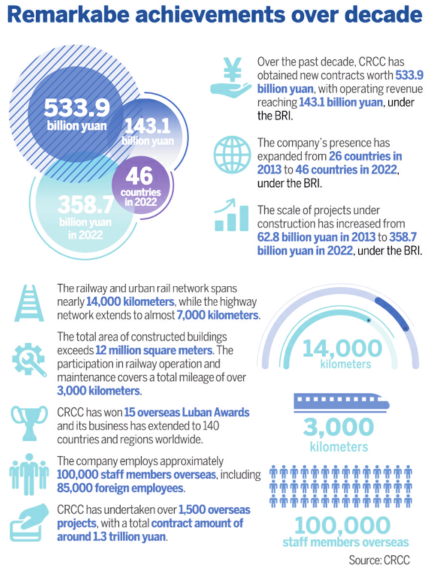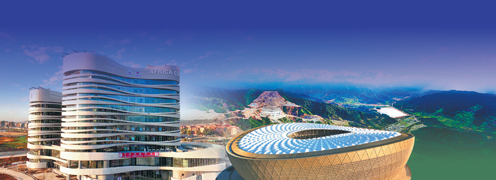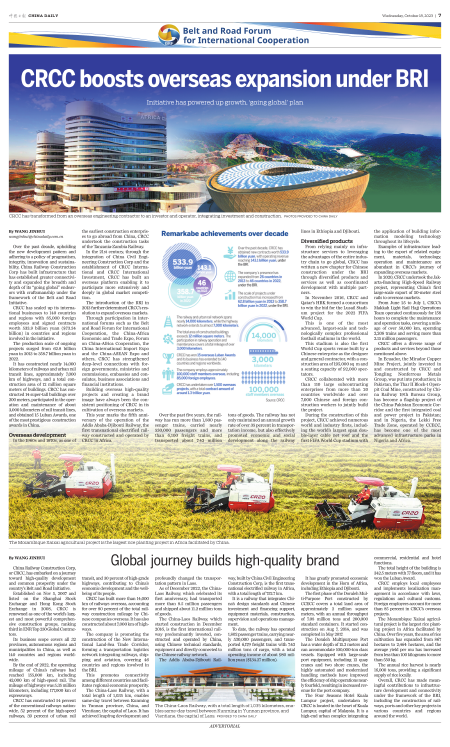

CRCC has transformed from an overseas engineering contractor to an investor and operator, integrating investment and construction.

The Mozambique Xaixai agricultural project is the largest rice planting project in Africa facilitated by China.
Over the past decade, upholding the new development pattern and adhering to a policy of pragmatism, integrity, innovation and sustainability, China Railway Construction Corp has built infrastructure that has established greater connectivity and expanded the breadth and depth of its "going global" endeavors with craftsmanship under the framework of the Belt and Road Initiative.
CRCC has scaled up its international businesses to 140 countries and regions with 85,000 foreign employees and signed contracts worth 533.9 billion yuan ($73.34 billion) in countries and regions involved in the initiative.
The production scale of ongoing projects surged from 62.8 billion yuan in 2013 to 358.7 billion yuan in 2022.
It has constructed nearly 14,000 kilometers of railways and urban rail transit lines, approximately 7,000 km of highways, and a total construction area of 12 million square meters of buildings. CRCC has constructed 14 super-tall buildings over 200 meters, participated in the operation and maintenance of about 3,000 kilometers of rail transit lines, and obtained 15 Luban Awards, one of the most prestigious construction awards in China.
Overseas development
In the 1960s and 1970s, as one of the earliest construction enterprises to go abroad from China, CRCC undertook the construction tasks of the Tanzania-Zambia Railway.
In the 21st century, through the integration of China Civil Engineering Construction Corp and the establishment of CRCC International and CRCC International Investment, CRCC has built an overseas platform enabling it to participate more extensively and deeply in global market competition.
The introduction of the BRI in 2013 further determined CRCC's resolution to expand overseas markets.
Through participation in international forums such as the Belt and Road Forum for International Cooperation, the China-Africa Economic and Trade Expo, Forum on China-Africa Cooperation, the China International Import Expo and the China-ASEAN Expo and others, CRCC has strengthened deep-level connections with foreign governments, ministries and commissions, embassies and consulates, business associations and financial institutions.
Building overseas high-quality projects and creating a brand image have always been the consistent positioning of CRCC in its cultivation of overseas markets.
This year marks the fifth anniversary of the operation of the Addis Ababa-Djibouti Railway, the first transnational electrified railway constructed and operated by CRCC in Africa.
Over the past five years, the railway has run more than 1,800 passenger trains, carried nearly 530,000 passengers and more than 6,100 freight trains, and transported about 7.43 million tons of goods. The railway has not only maintained an annual growth rate of over 35 percent in transportation income, but also effectively promoted economic and social development along the railway lines in Ethiopia and Djibouti.
Diversified products
From relying mainly on infrastructure services to leveraging the advantages of the entire industry chain to go global, CRCC has written a new chapter for Chinese construction under the BRI through diversified products and services as well as coordinated development with multiple partners.
In November 2016, CRCC and Qatar's HBK formed a consortium to win the bid for the Lusail Stadium project for the 2022 FIFA World Cup.
This is one of the most advanced, largest-scale and technologically complex professional football stadiums in the world.
This stadium is also the first World Cup sports venue built by a Chinese enterprise as the designer and general contractor, with a construction area of 195,000 sq m and a seating capacity of 92,000 spectators.
CRCC collaborated with more than 110 large subcontracting enterprises from more than 20 countries worldwide and over 7,000 Chinese and foreign construction workers to jointly build the project.
During the construction of this project, CRCC achieved numerous world and industry firsts, including the world's largest span double-layer cable net roof and the first FIFA World Cup stadium with the application of building information modeling technology throughout its lifecycle.
Examples of infrastructure leading to the export of related equipment, materials, technology, operation and maintenance are abundant in CRCC's journey of expanding overseas markets.
In 2020, CRCC undertook the Jakarta-Bandung High-Speed Railway project, representing China's first large-scale export of 50-meter steel rails to overseas markets.
From June 25 to July 1, CRCC's Makkah Light Rail Hajj Operations Team operated continuously for 158 hours to complete the maintenance and operation tasks, covering a mileage of over 50,000 km, operating 2,208 trains and serving more than 2.15 million passengers.
CRCC offers a diverse range of products and services beyond those mentioned above.
In Ecuador, the Mirador Copper Mine Project, jointly invested in and constructed by CRCC and Tongling Nonferrous Metals Group, was put into production; in Pakistan, the Thar II Block-1 Openpit Coal Mine, constructed by China Railway 19th Bureau Group, has become a flagship project of the China-Pakistan Economic Corridor and the first integrated coal and power project in Pakistan; and in Nigeria, the Lekki Free Trade Zone, operated by CCECC, has become one of the most advanced infrastructure parks in Nigeria and Africa.
wangjinhui@chinadaily.com.cn

